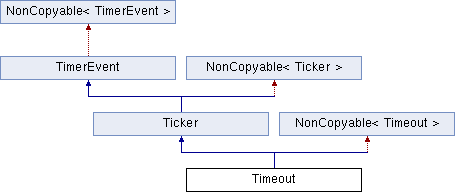- mbed
- Timeout
A Timeout is used to call a function at a point in the future. More...
#include <Timeout.h>

Public Member Functions | |
| template<typename F > | |
| MBED_FORCEINLINE void | attach (F &&func, float t) |
| Attach a function to be called by the Ticker, specifying the interval in seconds. More... | |
| template<typename T , typename M > | |
| void | attach (T *obj, M method, float t) |
| Attach a member function to be called by the Ticker, specifying the interval in seconds. More... | |
| void | attach_us (Callback< void()> func, us_timestamp_t t) |
| Attach a function to be called by the Ticker, specifying the interval in microseconds. More... | |
| template<typename T , typename M > | |
| void | attach_us (T *obj, M method, us_timestamp_t t) |
| Attach a member function to be called by the Ticker, specifying the interval in microseconds. More... | |
| void | detach () |
| Detach the function. More... | |
Static Public Member Functions | |
| static void | irq (uint32_t id) |
| The handler registered with the underlying timer interrupt. More... | |
A Timeout is used to call a function at a point in the future.
You can use as many separate Timeout objects as you require.
Example:
|
inherited |
Attach a function to be called by the Ticker, specifying the interval in seconds.
The method forwards its arguments to attach_us() rather than copying them which may not be trivial depending on the callback copied. The function is forcibly inlined to not use floating-point operations. This is possible given attach_us() expects an integer value for the callback interval.
| func | pointer to the function to be called |
| t | the time between calls in seconds |
|
inherited |
Attach a member function to be called by the Ticker, specifying the interval in seconds.
| obj | pointer to the object to call the member function on |
| method | pointer to the member function to be called |
| t | the time between calls in seconds |
|
inherited |
Attach a function to be called by the Ticker, specifying the interval in microseconds.
| func | pointer to the function to be called |
| t | the time between calls in micro-seconds |
|
inherited |
Attach a member function to be called by the Ticker, specifying the interval in microseconds.
| obj | pointer to the object to call the member function on |
| method | pointer to the member function to be called |
| t | the time between calls in microseconds |
|
inherited |
Detach the function.
|
staticinherited |
The handler registered with the underlying timer interrupt.
| id | Timer Event ID |